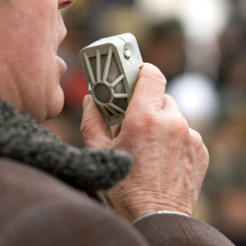Robert Ashton says collective acts of small actions have the potential to change the world.
I am a huge fan of the hospice movement. They provide essential, compassionate and very practical help to families at a time of great need. As with so many good things, hospice care is expensive and for most, around 75 per cent of their running costs have to be covered by fundraising activity.
So it was a pleasure to speak the other day to a group of business supporters of Ipswich based St Elizabeth's Hospice. Most were already well aware of the importance of hospice work. Many already gave time, money and expertise. So I chose to talk about how we needed to encourage the kind of fundamental societal change necessary to enable hospices to become far more financially self sufficient.
I talked a lot about social media, and how consumer criticism of poor business practice could spread virally and change corporate behaviour. I cited the recent example of Primark, shamed into making significant payments to the families of the Bangladeshi sweatshop workers killed when an unsafe factory collapsed trapping hundreds in the rubble. My argument was that whilst people want cheap clothes, few are prepared to see those low prices achieved at the cost of human lives.
Twitter means we all know what's going on behind the scenes. Of course not everything we read is true, particularly when people are accused and outed without fair trial. But when it comes to business ethics, there's usually hard evidence to support the campaigner for better behaviour.
Today we can not only choose to drink Fair Trade coffee, but with little difficulty, see for ourselves how once remote small coffee growers are benefiting. As we build a new post-recession economy it is becoming as abhorrent to the public to see exploitation as it is to learn of boardroom greed.
Perhaps predictably, as with charity, ethical behaviour starts at home. We cannot tweet angrily about the dubious ethics of others if we ourselves remain selfish and greedy. As a recent inheritor, I fund myself drawn to the seemingly easy money of buy-to-let investment. Yet equally, I am revolted by the impact that market has on those struggling to secure their first home. I doubt I can bring myself to do it and will no doubt be financially poorer in old age as a result.
But let me return to the hospice business audience. They were enlightened and already doing more than there share to contribute to the greater good. I thought I would illustrate to them just how easy it would be for the hospice they support to be fully funded by the NHS. Not by lobbying of campaigning, but by delivering cost savings elsewhere.
You see the day after the event I was going to be fitted with my first pair of hearing aids. The point had been reached when my wife was feeling unheard and worse, I could no longer confidently hear questions asked from the back of the audience. I'd been for a test and opted to buy privately.
I'd been surprised to be advised by the high street provider I'd chosen to seek an NHS prescription as well. 'They'll be useful as spares, in case yours need repair,' I'd been told. 'Don't tell your doctor you're going private, then we can get you a free NHS set as well.' I did some research.
According to Boots website, 150,000 people a year buy hearing aids privately in the UK each year. If each took this advice and obtained a free NHS back up set, and if we assume they cost the NHS £500 a set, that's £75m a year of unnecessary NHS spend.
Yes we all pay tax and yes we are entitled to them. But that money could certainly better spent elsewhere. A hospice bed costs £600 a day to run and that £75m would fund 342 hospice beds for a year.
It's a small sacrifice to pass on a set of NHS hearing aids you'll probably never wear. Yet the positive impact of passing on the invitation to waste public money is never explained. Big Society should never have been all about political rhetoric, but making real the very significant impact we can all have in our day to day lives. It's not the big things that change the world, but the collective effect of many small ones. You can start right now, by tweeting your views on this piece!









